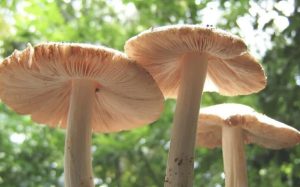A good mushroom may one day be used to make headphones, shoe memory foam, or airplane exoskeletons. Researchers examined one remarkable mushroom’s engineering potential and found that it could replace plastic in many uses.

Mushrooms could reduce trash. Fossil fuel plastics are hard to recycle and end up in landfills, landscapes, and rivers. Mushroom-based materials are compostable and can be recycled to make more of the same.
Science Advances published a study on Fomes fomentarius today. It can produce soft, spongelike fabrics to tough, woody ones. Researchers aim to make mushrooms a more sustainable building block by studying their architecture.
“We were really amazed at the structure because one thing that you immediately notice if you’re a biologist is that when something that beautiful starts to form, nature just doesn’t do it because of how nice it is — there must be a function there,” says Pezhman Mohammadi, one of the authors of the new paper and a senior scientist at VTT Technical Research Centre of Finland.
F. fomentarius may resemble a horse’s foot on a tree trunk in the wild. For millennia, humans have used it as fuel. Hoof fungus and tinder fungi came from that. New research suggests it could be used to make ultra-lightweight high-performance materials.
This fungus has three layers with unique properties that could be useful in various ways. The outer crust is tough enough to form windshield impact-resistant coating. Mohammadi says the middle layer feels nice on the skin and could mimic leather. Wood-like third inner layer. The researchers examined each layer’s possible uses using advanced imaging and mechanical strength tests.
Mushroom-based construction, packaging, and fabrics are gaining popularity. Mohammadi and his crew have already made a pair of headphones from mycelium, a fungus’ thread-like structure.
Mushrooms are still far from replacing plastic. Harvesting them from forests would harm the ecosystem. Mass-produce mycelium for sale. You could also alter the fungus’ genome to highlight certain traits. More study and testing are needed to ensure the materials are biodegradable and durable enough for consumers.
Mushroom-based goods should decompose after use, unlike plastic pollution. Fungus-made products can feed mycelium production as waste, making a closed-loop manufacturing process. That’s the benchmark for sustainable market products.